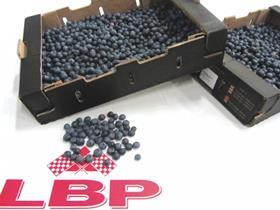
What notable steps forward has LBP Rotterdam taken in the past year?
Anton Filippo: “We have a few developments that we have started in the last 18 months or so and are still very much ongoing. The first is our ripening operations – ripening, ready-to-eat, treated fruit, it goes by several names and is very popular at the moment, and will only gain in popularity, especially in retail. We have recognised that and we have built within our facilities eight brand-new ripening chambers that we use for fresh, tropical fruits – for example, avocados, mangoes and kiwifruit, as well as some types of stonefruit.
We have also used it in the first year of operation on citrus that arrives to us a little too green – initially the authorities don’t allow the fruit in, but through the use of our heaters in these facilities we manage to get it through eventually. Otherwise, the fruit would have to be destroyed or shipped back outside the EU, so these facilities have been a big help. We still expect further huge growth in demand for ripening in the next few years – every consumer wants their avocado to be ready to eat, unlike previous years where you would buy an avocado and leave it in your kitchen for four or five days before consuming it. We have a little more space for expansion, and we could do a little bit more in the future.
The other thing that we are very much focusing on is our packing operations. We have a packaging and repackaging operation for citrus that we use for fruit that arrives in bins before sorting and repacking, for example, in 21kg boxes. We have also had equipment installed for blueberries – we have done one season of packing blueberries, we learned a lot, and we are looking forward to the future.
How did the market shape up in 2015, and how did LBP fare?
AF: It’s been a difficult year in the sense that 2014 was such an excellent year for us, probably the best we have ever had, and you always look to the previous year when you are making comparisons. We are still content, and happy with what we are doing, but there was a little problem in the industry in that business was not as good as it was in 2014, so the fruit isn’t going through as quickly as it was.
If we look at the storage period we have now compared to other years, we are storing fruit longer. People say “you should be happy with that”, but we’re not, because we’re not a storage company, we are a handling and logistics company. The quicker the fruit goes out, the better it is for all of us. We do storage, we have a capacity of 3,000-plus pallets, but you need pace, and throughput is very important. Hopefully it’s going to change very soon, but at the moment it’s not very good – not only for soft fruit but also in melons, grapes and other products – it’s difficult. These things fluctuate from year to year and you cannot properly forecast what will happen.
Which products have been the star performers?
AF: I would say a very hot product, particularly at the beginning of the year, was blueberries, but I think avocados have definitely been the biggest hit of the year. The fruit is getting more and more popular – we even saw the Mexicans shipping avocados by airfreight to fulfil the demands of the market, which is very unusual. I go back to the desire for consumers to get their hands on ripe, ready to eat avocados – the popularity is incredible.
Which potential growth markets are catching your eye?
AF: In August we went on another trade mission to Colombia, somewhere we initially visited at the end of 2014 together with our minister for international trade, and Colombia remains one of our key focus points for the future. It is a country where we see possible growth, as it boasts a very good economy and positive developments in areas such as avocado production. They have a lot of things to improve there still, like infrastructure, Globalgap certification and greater help from the government, but there is definitely potential. Another focus point for lbp is Peru, and we have even employed somebody to help us promote our services there. We see a lot of opportunities in these two markets in particular.
Are there any other projects you have been working on?
AF: I was asked to do a speech at the pma Fruittrade in Chile, about the Port of Rotterdam as a hub for Europe. In fact we, along with a number of importers in the Netherlands, plus one or two service providers, have formed a group governed by the country’s fruit and vegetable industry called ‘Expert Team Logistics’. We talk to the government, customs, different institutions, to see where we can help improve the level of their services, because there are lots of things to work on. These include aspects like inspections and customs scanning, where there is plenty of scope for improvement – the Port of Rotterdam is getting bigger and bigger, but we still need the throughput, so keeping standards high is crucial



